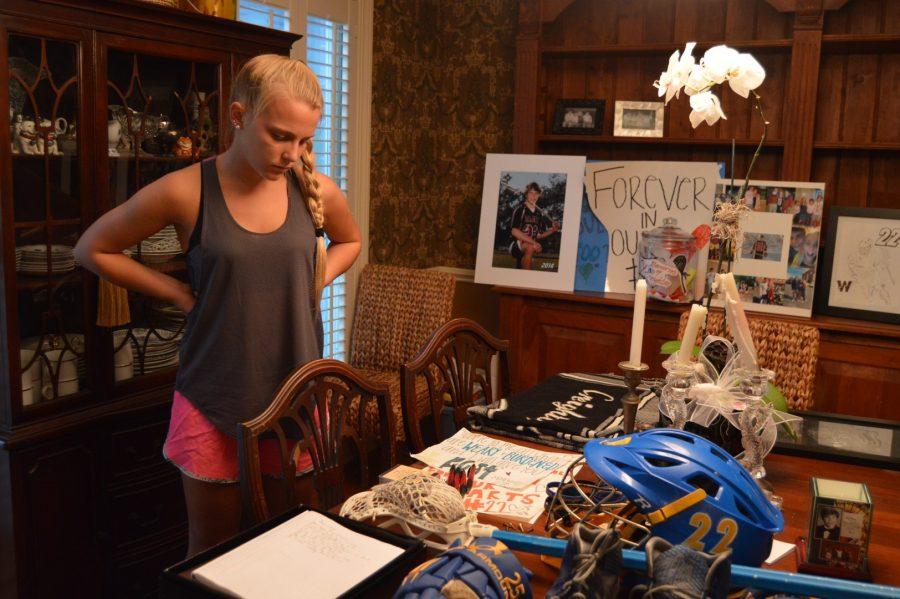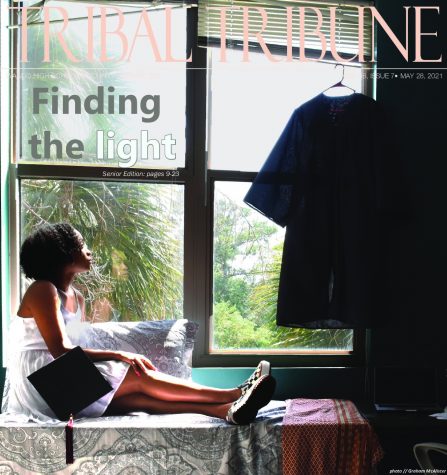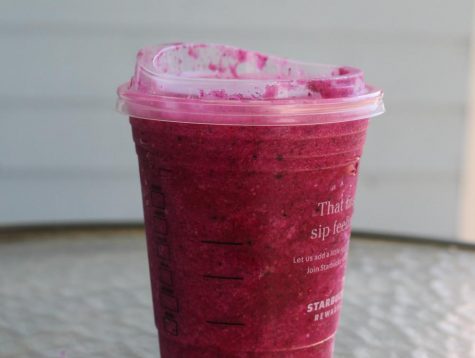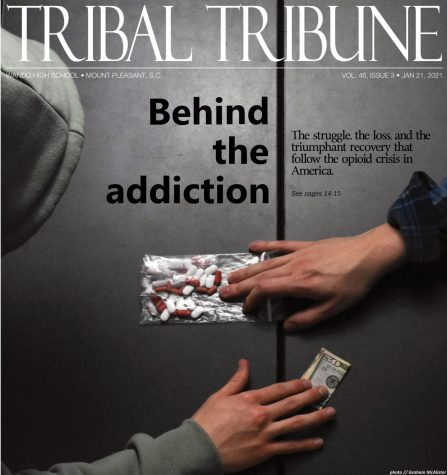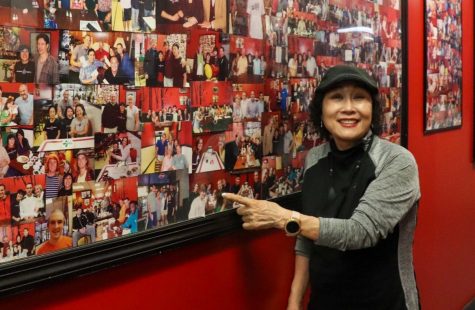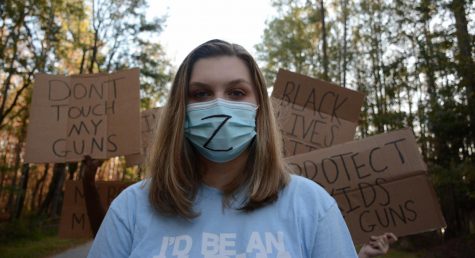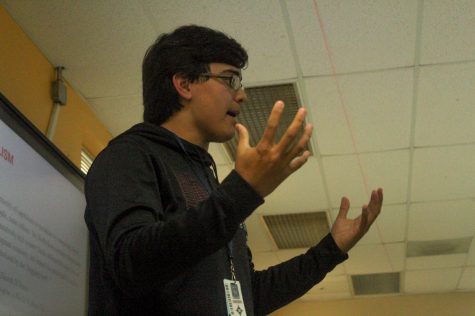Shipman Strong
At the sound of the doorbell, a grinning, lapping dog bounds to the front door, a young blond-headed boy chasing after him. The foyer is warm and inviting, the fading beams of sunlight on that late September afternoon dancing across the walls, which are lined with pictures. Pictures of blonde-haired, blue-eyed children in jerseys, the number “22” worn proudly on their chests.
The house is full of life, worn with love. A “home” in every sense of the word.
It’s not what you picture when you hear the words “heroin overdose.”
You might imagine the stories with Not So Happy Endings. You might picture dirty needles, tired souls and illness. And you’re probably thinking about all of the Kurt Cobains, the Janis Joplins. The strung out, hollowed junkies, as thin and pale as paper.
Don’t. Because that’s not who this story is about.
Creighton Shipman graduated from Wando in 2015, set to play lacrosse at Mars Hill University. He was the co-captain of the varsity lacrosse team his senior year. He was a brother. He was a son. He was a friend.
He died on July 17.
He had recovered from what could have been a life-altering bacterial infection in his leg during his freshman year. A week after a seemingly minor injury, he was experiencing excruciating pain.
After a doctor’s visit, he was prescribed opioid-based painkillers.
The pain did not go away. Bacteria was attacking the bruised bone from the injury, creating an abscess and turning the area around the bone septic.
“They didn’t think he was going to live,” said Nanci Shipman, Creighton’s mother. “They didn’t think he was ever going to walk the same. I remember the day he was first able to put weight on it, and even that was about three months after the surgery. It was supposed to be life-altering.”
But by senior year Creighton was back to 100 percent, and had earned a co-captain spot on the lacrosse team. He was doing well in his classes, spending time with friends and making the most of his final year at Wando.
Things were still normal.
“There are things that parents are always concerned about. Grades, friends, coming home on time,” Shipman said. “And I’m someone who has always said, ‘for every action, there’s a consequence.’ So if Creighton came home late, he’d get his phone or keys taken. But that was it. And I think that’s how most kids are. So no, there were no red flags.”
No agitation, no physical symptoms. No drug paraphernalia hidden in his room. But whether Creighton knew it or not, the seed of addiction had already been planted.
“I didn’t realize that Creighton got to the place he eventually was from that surgery. There were no signs, not freshman year, sophomore year or junior year that he was searching out or seeking out drugs,” Shipman said.
It was the summer after senior year that she began to pick up on subtle changes in her son.
“The changes I saw were nothing that made me think ‘he’s definitely doing drugs,’ but it was a little more of him saying ‘I’m 18 and I can do what I want.’ He was a little more defiant,” Shipman said.
“But to live in Charleston and to go to a school like Wando, or B.E or Porter Gaud, nowadays, is difficult. You can’t live under a rock,” she continued. “Not only is there a lot of exposure to drinking, but to pot and other drugs…I mean, pills were even being introduced when I went to Wando in the ‘90s. And anyone who kind of denies that…I just find that hard to believe. The society y’all are in is 100 percent harder than it was when I was at Wando.
“So did Creighton live under a rock? No. But was he going out every night? Breaking things? Coming home stoned? No. Yes, he went out. He was a typical teenager. But there was no indicator that he was skipping classes, doing drugs, anything like that.”
Shipman was always up front with Creighton, as well as the three younger Shipman children, about the dangers of drugs, alcohol and addiction.
“I’ve always stressed to them that it doesn’t matter whether it’s drinking, smoking pot, doing pills, sex, gambling, anything that you do too much of — even exercising — that’s a form of addiction,” she said.
Although there is a history of addictive tendencies on Creighton’s paternal side, Shipman said, genetics are not solely to blame. It’s easy to chalk up something as complex as addiction to any variable in a person’s life: family issues, influences, genetics, circumstances. But one of the most important things to understand is that this is simply not the case. At least not with Creighton.
“People like to pigeon-hole. Because a lot of people, even other mothers, say ‘Well what made Creighton make that turn?’ And I’m like, ‘What do you mean?’ and they respond, ‘Well, what made him want to go the heroin route?’ And the thing is, what person cracks open a beer and thinks to themselves, ‘I’m going to become an alcoholic?’” Shipman said. “No one. It’s subtle changes. And with Creighton, especially his freshman year in college, there were decisions, or lack of decisions, he made that put him into certain situations. It’s gradual.”
*
Creighton began his first semester at Mars Hill University in North Carolina, located northwest of Asheville. He had an academic/athletic scholarship, and he was on an intense training schedule.
“He was working out every day with all of these guys, and loved it,” Shipman said. “He called them his brothers, his family. He missed Charleston, but he was happy to be where he was.”
Shipman went to visit her son for parents’ weekend early that fall. The lacrosse team had a scrimmage that weekend, and he was starting as a freshman. Shipman remembers her son looking healthy, strong and happy.
“He just seemed…a little preoccupied,” she said.
Weeks passed, Thanksgiving came and went, and all the while, Creighton was himself. No red flags.
Christmas. As Shipman recalls, her son looked healthy, but seemed more distant than his usual charismatic self.
“He wanted to be gone with his friends, didn’t really wanna be bothered with family stuff at all,” Shipman said. “He did a few things with us. He did Christmas. He stayed here. But, towards the end when it was time to go back to school, he didn’t make his grades to be dressed out playing lacrosse, which he had worked all fall for. He was very upset. He talked to his coach over the break, and the coach told him he could be on the practice team, but he couldn’t dress out.”
Creighton had never failed a class before. It was a shock, but it wasn’t necessarily an indicator of the inner battle Creighton had begun.
“He had this crazy sense of humor,” she continued. “Just stuff you’d always think of saying but would never really say or do. The funniest stuff. And that wasn’t really there over Christmas. And if I had to say there was one indicator, it was probably that. He didn’t laugh like himself over Christmas.”
Creighton returned to Mars Hill in January. He continued playing on the practice team, but began to withdraw slightly more. Less calls home, less texts to the family group message.
“When he did [call and text], it was always just about how he wanted to come back to Charleston, he didn’t like the snow and how cold it was,” Shipman said. “Not his usual funny stuff.”
But college is the first time most people are on their own and away from home. So Creighton’s change in behavior looked a lot more like a young adult simply trying to find his way rather than a drug addiction.
In February, Creighton quit the practice team.
“I didn’t agree with it,” Shipman said. “That was his family, his brothers. He said that over Christmas — ‘I just want to get back to my brothers.’ So he was no longer a part of the team.”
Around Shipman’s birthday on Valentine’s Day, she received a call from Creighton.
“He was really upset, and was saying how he wanted to come home and ‘this just isn’t for me’…he was just really down. So I went up to visit him — and mothers and fathers, and people who love you regardless, they have an intuition…something just didn’t seem right,” she said. “And it wasn’t as much what he said as what he didn’t say. I could feel sadness in his voice.”
She made the trip to Mars Hill.
“He looked different. When I say looked different…he looked tired, he had dark circles under his eyes,” Shipman said. “He’s always been very active, and just didn’t look like himself. He was quiet…none of my children are quiet. I was worried about him.”
Shipman met all of Creighton’s professors, his student mentor, his advisor — all of whom spoke highly of him.
“When it was time for me to go I felt like his spirits were in a better place,” she said.
Creighton came home for spring break. But the uplifted spirits from the February visit didn’t follow him back to Charleston.
“He looked worse. He looked more pale, which granted, happens when you live in the mountains, but he looked more tired, too,” she said. “He didn’t look good. And when he got here he didn’t want to talk hardly at all. He was very agitated, angry and didn’t really want to spend any time with us. I was worried about him, like, really worried. And I kept asking him, ‘What’s wrong?’ and he just replied ‘I hate it up there; it’s cold, I’m not playing lacrosse, just everything.’”
The changes Shipman had noticed in her son since Thanksgiving had come to a crescendo.
“It’s weird to explain to people, but in our eyes…we twinkle. It sounds cheesy, but we twinkle. Our eyes show a lot. His eyes were different.”
His twinkle had faded.
“It was like brass tarnishing,” she said. “In March, I thought, ‘Oh my god, I can hardly see any of my child.’”
Creighton became even more withdrawn over the next month. Barely called. Only occasionally replied to texts. His freshman year ended, and he came back to Charleston for the summer.
“He was home less than a week before I had to kick him out,” Shipman said. “We had a confrontation — and I don’t like that word because it sounds like we got in a fist fight. There was no physical fighting. But he just kind of exploded after I asked him some question about his friend’s car being outside. And he was just yelling…and I’m big on respect. Respect me, respect each other, respect everyone you meet, respect yourself. And I said, ‘This is not how you conduct yourself in this house.’ And I had asked him, back in February, when I first saw the significant changes; ‘Are you doing something different? Are you doing drugs?’ I know it’s college, and people experiment with things, but he always said ‘No mom, no. I’m fine mom, I’m fine.’”
“I’m fine mom, I’m fine.”
Hollow words. The script the addiction had given him.
“It was the Wednesday after Mother’s Day, and it was in the morning. Wheaton and Jack had gone off to Wando, and I was taking Hollis to school when we had this big altercation,” she continued. “I was really sad, and I said, ‘This is the least amount of respect you’ve ever shown this family. I can’t condone this. This isn’t a choice anymore. You can say you’re not on drugs, you’re not doing anything, but the way you just screamed at us, all that you just said…none of that was a choice. You need help. I want you to be out of this house by the time I get home from dropping Hollis off.’ And I stressed to him that I loved him more than anything in this world, but I wouldn’t allow him to act this way in our house.”
It was the hardest thing she’d ever had to do.
He was gone two hours later.
Apologies began to roll in — calls, texts, he wanted to come home.
“He said he was so sorry, and he’d never act like that again…but I just had a funny feeling,” Shipman continued. “I knew it wasn’t depression or a mental illness. I knew it was drugs.”
Creighton lived with friends for a month. Although he wanted to come home, Shipman insisted that he could only return to the family home if he sought professional help. To some, this may seem harsh, but Shipman knew the only way her son would find lasting positive change was if the decision came from him.
“I never asked him specifically what he was doing,” she said. “Because to me, that wasn’t the point. He needed some professional help — nobody, especially the child I knew, would’ve ever screamed and yelled and conducted himself the way that he did that morning. That wasn’t a choice.
“When someone needs help, they have to be the ones to own it,” she continued.
On June 7, Creighton called his mother.
“He said, ‘You’re right, I need some help. I can’t do this on my own,’” Shipman said.
She helped him get in contact with Sam Wells, a regional representative for Willingway, the rehabilitation center that Creighton ended up going to in Statesboro, Ga.
That same day he posted a Facebook status announcing that he would be entering the rehabilitation center. He wanted to get better so that he could return to Mars Hills and earn his spot on the lacrosse team back for his sophomore year.
Creighton called the facility and arranged to check in the next morning.
“I was just in shock that the thing I had been praying for for so long was finally happening,” Shipman said.
Early the next morning, Creighton drove him and his mother to Statesboro.
The sun radiated warm light through the open windows and radio music filled the car as mother and son made the two-hour drive to Statesboro. It was a beautiful day. And all the while, Creighton’s phone never stopped ringing with texts, calls, Snapchats and videos of love and support from friends and family.
“You’ve got this, 22!”
“We love you, brother!”
“We’re so proud of you.”
“I could tell he was nervous, but he was happy,” Shipman said. “I kept thinking about what he said to me and Jack and Hollis the night before: ‘I just want to get my life and family back, and this is the only way I can do it.’”
A receptionist greeted Creighton and his mother as they walked into Willingway, and asked how they were doing.
“Excited,” Creighton responded.
The receptionist laughed. “In the past 10 years, I’ve never heard anyone say that,” he said.
But it was true. Creighton was excited, and for the first time in months, he smiled. A real, Creighton smile.
The time came for mother and son to say their final goodbyes, and there was a certain happiness and optimism to these moments. Yes, there were tears. But that the goodbye was to the Creighton that had been suffering so greatly; and Shipman thought the next time she saw her son, she’d be seeing a healed soul.
Shipman held her son in a teary embrace.
“He said ‘Mom, don’t be sad, it’s going to be okay.’ And I said ‘I’m not sad, I’m more proud of you than I’ve ever been,’” she said. “‘You’re a 19-year-old man doing something that no one in your family has ever done.’”
Patients at Willingway have no access to technology: no phones, no computers, no social media. So the only way Creighton could communicate with his friends and family was through handwritten letters.
Creighton’s Willingway counselor, “Bubba,” called the Shipmans once a week to tell them how well Creighton was doing.
“In Creighton’s letters, it sounded like him,” Shipman said. “When I talk about the guy I knew, the son I knew, the brother they knew…it was clear. His humor was there, he talked about lacrosse and how he couldn’t wait to come back and throw around with [his siblings]. And he talked about how he couldn’t wait to go back to Mars Hill at get back into lacrosse and kill it at school and see his brothers on the team again…it was just promising.
“It was reassuring because when parts of people’s personalities start to shut down, you miss them. And you don’t necessarily realize who they were until they aren’t that person anymore,” she continued. “And the letters were good because it was him. The cleverness, the humor, it was there.”
In late June, Shipman received another letter from her son. It was two weeks before Family Week, when she would be going to visit.
The letter said:
Mom, you’ve always raised us to be very open and honest, and you’ve always been that way with us. So I want to be honest with you, so that you have as much time to prepare as possible. My drug of choice is heroin. I don’t say “no” to too many things, but heroin is my drug of choice. I’ve been doing it since November of 2015, and I started injecting it the last three months.
Heroin.
“When I read that, I felt like I had been sucker punched,” Shipman said.
Her voice cracked as she breathed in sharply, as if she was reliving the pain of that moment. She held back tears.
“It still hurts to say that word…it’s a scary word. When I hear it I think of the heavy metal people from the ‘80s, a lot of overdoses, those Seattle grunge bands I used to like. You think of junkies. I thought of gaunt-looking figures…that was a scary day, when I read that. Because I knew that was something that was forever. It was something you don’t hear many good stories about,” she said.
“And I felt so sad for him, to know he had been battling something so awful for so long…” she continued. “It’s a hard word to read, it’s a hard word to say, and it’s still hard. To see that word is still something that catches my breath every time…I just didn’t know.”
On July 10, Shipman went to Statesboro for Family Week.
“He looked like himself again,” she said. “He had gained weight — I learned that he had lost almost 25 pounds before he came there. His coloring was back, the light was back in his eyes and he had this great smile.”
That day, Bubba and Creighton told his mother about his plans: to go back to Mars Hill in the fall, to get back on the lacrosse team. He was excited, determined. There was a plan.
But within the next few days, the plan started shifting.
“He started saying things like, ‘I might just go to Trident, I don’t need to go back to Mars Hill,’ and just seemed less enthusiastic. And that really scared me, because he had had this plan for six weeks, and now it was changing,” Shipman said. “He was like, ‘Maybe I won’t even go to Trident, maybe I’ll just work.’ And I was like, Creighton, what are you talking about? You have this plan in place. If you don’t want to go back to Mars Hill, that’s fine, but you need to tell to your counselors so we can get a plan together.”
So he did and was met with objection from his counselors. They were alarmed that he suddenly wanted to change the plans he had been so passionate about — and so was his mother.
“With everything shifting and changing like that, I just thought it wasn’t a good idea for him to come back to Charleston,” she said. “And I told him that he needed more care. You can’t just be super clean and sober after 30 days from something like heroin, that’s just not how it works. He would have to continue outpatient back in Charleston and go to meetings in Mars Hill, so I decided that it just wouldn’t be good for him to be back at our house in Charleston. I thought it would be enabling him because there wouldn’t be a plan in place, and that would be setting him up for failure.”
On Wednesday, July 13, Shipman told Creighton that she and his counselors had decided that he wouldn’t be allowed back to his family home in Charleston, and he needed more help. His counselors told him he had to go to a sober house.
Creighton refused.
*
His counselors warned him that if he didn’t go to the sober house, he would be on his own. No wallet, no phone, no car. Alone.
“Which sounds so harsh unless you know how these things go,” Shipman said. “Because the more you hand-hold them, the less they feel consequences, the less they learn and understand the choices or lack of choices they make.”
He packed his things and left.
“I was in an office with a counselor, crying my eyes out. I was heartbroken,” Shipman said. “I couldn’t go after him. And I knew it was the right thing to do, but it was the hardest thing to do because all I wanted to do was pick him up and take him home and make it all okay…but what was done was the best thing, it was what was most healthy. Which sounds so weird, but that’s how this works, this disease of addiction.”
However, the counselors assured Shipman this was normal in inpatient treatment. Patients get frustrated and emotional, they leave, and usually call from a public phone to be picked up or come back later.
Although Family Week was supposed to last another day, Shipman decided to leave that night. Creighton had left treatment, telling others he was going to a nearby Starbucks.
“I couldn’t be in a hotel knowing my child was somewhere else…so I packed up my stuff and got in my car,” Shipman said. “I got in my car to leave. Wheaton was in Richmond for lacrosse and the boys were in Charleston. I got about five miles outside of Statesboro, and just got a weird feeling. I felt exhausted, hadn’t gotten much sleep that week. So I decided I needed a coffee and went back to Starbucks. Not to see Creighton. In my head I’m going, ‘I’m not going to enable him. I’m going to get coffee and a cookie. Sugar and caffeine, so I can get home to Charleston.’ But deep down, I was hoping I’d see him. But I justified it by saying I needed caffeine and sugar.”
She parked, went inside and ordered. She asked the baristas if they had seen a 19 year old who had ordered water, as Creighton had no money to order anything else.
Nothing. Nobody had seen him.
She walked out of Starbucks. It was time to go home.
As she crossed the parking lot, she glanced to her right.
There he stood, chewing on a straw.
“Mom!” Creighton cried.
She asked him where he was going.
“Nowhere,” he replied.
She asked who was picking him up.
“No one.”
She asked what he planned to do.
“Nothing.”
She begged him to go back to Willingway, to go to a sober house. She pleaded. She cried. She went against everything that the counselors and doctors had told her to do, but as a mother she had to try.
“I told him I wasn’t gonna beg more if he didn’t want to go,” she said. “And I had to justify it in my head, which is weird, but I said, ‘Well I’m just tired and that’s why I came to get a coffee. I didn’t come to look for you, I just came for this and now I’m going home.”
He just looked at her.
She asked one final time if he would go back to Willingway. He refused.
“I told him I loved him very much, and he said ‘I love you too,’ and we hugged,” she explained. Tears began to roll down her cheeks. “We gave each other a kiss on the cheek, and that was that. It was the hardest, longest drive home…but I felt good in my heart that I at least tried, I at least got to talk to him.”
She didn’t know who was picking him up.
She didn’t know where he was going.
She didn’t know this was the last time she would see her son alive.
There was a knock on the door of the Shipman house in Mt. Pleasant early on the morning of July 15. Shipman got up, walked into the foyer and saw a police officer standing outside.
“I felt relief, which is weird, but I was happy because I at least knew that Creighton wouldn’t be a John Doe because I thought the policeman was there for Creighton,” she said.
“I opened the door, and this sounds odd too, but I said ‘I’m Nanci Steadman-Shipman, mother to William Creighton Shipman, 1/1/1997,” she continued.
“You’re Nanci Steadman?” the policeman asked.
“Yes,” she replied.
He pointed to a name on a sheet of paper, asking if it looked familiar. She had never seen it before.
The officer wrote a phone number down on the paper, and instructed her to call immediately.
“Is this about Creighton?” she asked.
“Ma’am, I don’t know what this is about, I was just told to come to this address and get in contact with you,” he said.
She called the number, introduced herself. A woman’s voice said, “You’re the mother of William Creighton Shipman?”
“Yes.”
“We have him here, we received a 911 call at 4:30 this morning, and he’s here in our care in the emergency room.”
Shipman heard only a few words.
“You need to get here as soon as possible,” the woman on the phone said.
“What is this about?”
“Ma’am, you just need to get here.”
She hung up the phone, looked at the officer in her doorway.
“Are you okay?” he asked.
She collapsed.
“They have my son,” was all she could say. The phone call felt like a blur, the details toned down by the roar of fear in her mind. The officer asked where the hospital was, and she couldn’t even remember. It was all too much.
The officer called the hospital back and got the details.
“This is serious,” he told her. “You need to get up there now, the hospital is in Columbia.”
Shipman called her sister, and together they made the drive to Columbia. She rushed into the E.R, and was told that Creighton was not expected to live until noon.
Nine-one-one had been called early that morning, and by the time the EMS arrived at Creighton’s location, he had no pulse, no heartbeat, no sign of life. They were able to resuscitate him, but his pulse was dangerously low. He was going into major organ failure.
He had overdosed on heroin.
“When went into the room, I was preparing for the worst,” Shipman said. “But when I went in there, even though he wasn’t conscious, he looked just like himself.”
The rest of Shipman’s family was called. His father, siblings and a few close friends and other family members were on their way to the hospital.
In the meantime, Shipman was told a test needed to be conducted to determine if Creighton had any brain activity, or at least enough for the doctors to perform dialysis to possibly save his life.
Because there was a risk of Creighton going into cardiac arrest during the transition from his hospital room to the room in which the test would be conducted, Shipman decided to postpone the test until his whole family could be there.
By that afternoon, things had started to look up. Creighton’s urine had become clear and at one point the nurses had to ask family members to leave the room because Creighton was becoming “overstimulated.”
“I thought that was a good sign because how can you be over stimulated if you don’t have brain activity?” Shipman said.
He was even being taken off blood pressure medication, and his heart had become relatively stable. The doctors were shocked — Creighton wasn’t supposed to live past noon, but now they believed he would survive through the night. They would be able to conduct the test the following day.
Saturday, July 16. The test was a PET scan, when glucose is pumped into the bloodstream and absorbed by the brain, and the results are displayed on a screen. Areas of function will light up because they are utilizing more glucose and are therefore more active. Areas of black mean no activity. If his brain had a significant amount of activity, dialysis could be performed..
The results came back.
All black. Nothing.
There would be no dialysis.
Creighton’s closest friends and his siblings, Wheaton, Jack and Hollis, spent the night with him in the hospital.
Wheaton spent the entire night by her brother’s side. Talking to him, resting her head by his, holding his hand.
“It was the worst feeling in the world. You just want him to wake up, and you think maybe he’ll open his eyes or squeeze your hand or something…” Wheaton said.
The next day Shipman and other family members came back and spent their final moments with Creighton. They gave their final hugs, touched his face and his hands for the final time. They said goodbye to the brother, the son, the friend and the teammate that they loved so dearly.
Creighton passed away that afternoon.
“We have to do whatever we can to make sure no other family has to feel this type of pain, and so no one has to fight this hard to get their life and family back,” Wheaton said to her mother that day.
“So I promised her and the boys that whatever we had to do to prevent this from happening again, we would do it. We would do whatever we could,” Shipman said. “Even though Creighton left this world, and a miracle didn’t happen, he didn’t have to stay here fighting anymore. He got to have his life and family back eternally.”
As the family left the hospital on that summer afternoon, a rainbow stretched across the sky. A perfect rainbow, bursting with life and color.
Just like Creighton.
The Mount Pleasant and Wando community welcomed the Shipmans back with warm, comforting arms.
“We found out that there had been a vigil at the church, and I wish I could’ve seen it because I heard so many beautiful things about it,” Shipman said. “We saw the fence at the Old Wando, and there was a big lacrosse goal in our neighborhood that said ‘We love you Creigh’ — there was so much love. I’m so thankful. Because at the hospital, I was so worried that Creighton would be remembered for his fall…and he was so much bigger than his disease and his fall. So to come back here and see what people had done, I knew people remembered him for him and for who he was, not the fall.”
Today, there is a room in the Shipman house dedicated to Creighton’s life. It’s filled with lacrosse equipment, signs made by friends and family, old pictures, childhood art work, jars filled with memories, letters from loved ones and other gifts and symbols of the life Creighton lived. It’s a room as full of life and love and excitement as he was, as if his presence is still there.
But for the Shipman family, it’s not just about the ending. It’s not about the fall. It’s about moving forward, about applying Creighton’s vivacious and tenacious spirit into the path ahead and telling his story. Not for pity, not for sorrow, but to create effective change. To prevent this from happening again.
Rewind almost five years. Creighton’s leg injury. He’s prescribed opiate based painkillers.
The same opiates that create the high found in heroin.
“He got the painkillers for his leg, and he liked that initial high, the way the painkillers made him feel,” Wheaton said. “So he started doing other things and then he eventually got back to that high he felt when he was a freshman when he tried heroin and then he couldn’t stop.”
Sadly, there are a shocking amount of cases just like Creightons. It spreads from high school and college athletes given painkillers for injuries to your middle-aged parent with a back problem to your grandpa with a knee replacement. And there is an increasing amount of young adults who start off taking opiate based painkillers such as Oxycontin or Hydrocodon, and then make the fatal transition to heroin.
“There is a statistic out there that suggests that 80 percent of new heroin users today started their addiction by misusing prescription opioids,” Jason Sandoval said.
Sandoval is a Charleston DEA agent, and is working with the Shipmans on building a campaign to spread awareness about the dangers of opioids and opioid addiction.
“So if you think about what that number represents — it represents that people can become addicted to something that they have no intention of leading into an addiction…,” he continued. “Heroin is reportedly 95 percent chemically similar to opioids, so people know, based on word on the street, that once you run out of opioids, whether you can’t get another prescription filled, or you can’t find some in the family medicine cabinet, that you can go to heroin and use heroin.”
Street heroin is also cheaper than prescription opioids and more powerful too, creating the perfect storm for someone struggling with an opiate addiction.
“A case like Creighton’s is all too common in today’s society. In fact, most teens who are prescribed an opioid, one-third of them will use and abuse the drug by age of 23, which means you are looking at people and anyone who is misusing an opioid is a potential heroin addict,” Sandoval said.
And the problem of opioid abuse and addiction is not only one increasing at a rapid rate, but one that knows no boundaries. Heroin carries the image of a drug used only on the fringes of society. However, the rise of prescription opioid addiction has created a whole new gateway for heroin to enter the lives of young people everywhere, regardless of location or class.
“Creighton was a captain of the lacrosse team, he took AP classes…he did normal stuff. So I hope people understand that it can happen to anyone,” Wheaton said. “I would always hear about things like this happening, and I always thought, ‘That could never happen to us.’ I couldn’t imagine that. I used to have nightmares about one of my brothers dying, and I would always wake up and think ‘It’s fine, that will never happen.’ But it did. And I still can’t believe it.”
The Shipman family is now working on a local awareness campaign to help spread this message.
“We’re working with the DEA to do the ‘Wake-Up Charleston’ roll out campaign,” Shipman said. We’re working with some local leaders — the Charleston police chief, Rev. Rob Dewey of Coastal Crisis Ministries, different people with the school system…it’s a true collective community effort with this campaign. We’re trying to educate and create awareness and there will be speakers…because this is something that’s not pretty. And Charleston’s numbers for this stuff are staggering.
“Given the information I know now, like during all of that stuff going on with Creighton’s leg, I would’ve explored every other option in terms of how to deal with the pain in a different way,” she continued. “I would’ve found other avenues [besides opioid painkillers]. I didn’t know just how much it rewires your brain, and I didn’t realize that it given all of the circumstances, those painkillers would turn on a switch that would never turn off, so that’s what I would do differently.”
And even then, the issue isn’t restricted to just opioids. In recent years, the spike in the abuse of many prescription medications, specifically Xanax and Adderall, has contributed to what is a bubble on the verge of bursting: a new culture of drug abuse disguised as medicine.
“I would’ve never made the connection if it weren’t for Family Week this past summer,” Shipman said. “I would’ve never known that it all began with those pills his freshman year.”
Shipman believes the public must first be open about addiction and drug abuse as a whole — to stop the judging and shame, and to come together to fight this disease that plagues so many people today.
“You’re not alone. Addiction is a disease, and people are recovering moment by moment,” she said. “I strongly urge them to find help and support and open your mouth and find someone. I’m telling you from first hand experience that everyone is touched by it, and you’re not alone. No matter how embarrassed or guilty or ashamed we might feel about what we or a loved one went through, we have to realize that it’s the same experience as someone else suffering with addiction. It’s a seriously real disease, and it has to be recognized, because no one would choose to hurt the people they love, to lose the things they hold close including their goals and their life. No one chooses to say ‘I’m going to die of heroin addiction.’
The Shipman family has also started the Creighton Shipman 22 Forever Foundation, in order to help bring those who may be embarrassed or ashamed out of the shadows.
“It’s there to help people not feel so alone,” she said. “People think that there are lone wolves, and when it comes to addiction, there aren’t. No one is alone, and we’re all in this together.”


